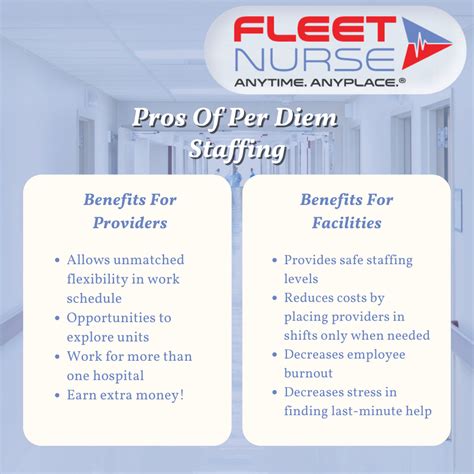Intro
Discover flexible part-time nursing careers in your local community. Explore 5 in-demand nursing jobs, including per diem nursing, telehealth nursing, and nurse education. Learn about the benefits, requirements, and salary ranges for each role. Find a fulfilling part-time nursing career that suits your lifestyle and skills, and start making a difference locally.
As the healthcare industry continues to grow, the demand for skilled nursing professionals has never been higher. While many nurses choose to pursue full-time careers, there are numerous part-time nursing careers that offer flexibility, autonomy, and a sense of fulfillment. If you're looking for a part-time nursing career that allows you to make a difference in your local community, here are five options to explore.
Nursing is a rewarding profession that requires dedication, compassion, and a strong work ethic. Part-time nursing careers can be an excellent way to balance work and personal life, while still making a positive impact on the lives of patients and families. Whether you're looking to supplement your income, gain experience, or simply give back to your community, part-time nursing careers can be a great fit.
From hospitals and clinics to nursing homes and community health organizations, there are numerous settings where part-time nurses can make a difference. With the rise of the gig economy and flexible work arrangements, part-time nursing careers are becoming increasingly popular. In this article, we'll explore five part-time nursing careers that you can explore locally, including their benefits, requirements, and growth prospects.

1. Per Diem Nursing
Per diem nursing is a type of part-time nursing career that involves working on a day-to-day basis, often on short notice. Per diem nurses are hired to fill staffing gaps in hospitals, clinics, and other healthcare settings, providing temporary support to permanent staff. This type of nursing career offers flexibility and autonomy, as per diem nurses can choose when and where they want to work.
Benefits:
- Flexibility to choose when and where you work
- Opportunity to gain experience in different settings and specialties
- Competitive pay rates
Requirements:
- Current nursing license
- Minimum 1-2 years of experience
- Ability to work independently and make quick decisions
Growth Prospects:
- High demand for per diem nurses in hospitals and clinics
- Opportunities for advancement to leadership roles or specialized nursing careers
How to Get Started
To get started as a per diem nurse, you'll need to register with a staffing agency or apply directly to healthcare organizations. Many hospitals and clinics have their own per diem nursing programs, so be sure to check their websites or contact their HR departments for more information.

2. School Nursing
School nursing is a part-time nursing career that involves working with students, teachers, and parents to promote health and wellness in educational settings. School nurses provide health screenings, administer medications, and develop health education programs to support student learning and success.
Benefits:
- Opportunity to make a positive impact on students' lives and education
- Collaborative work environment with teachers and other school staff
- Regular hours and predictable schedule
Requirements:
- Current nursing license
- Pediatric experience or specialized training in school nursing
- Ability to work with children and adolescents
Growth Prospects:
- Growing demand for school nurses due to increasing focus on student health and wellness
- Opportunities for advancement to leadership roles or specialized nursing careers
How to Get Started
To get started as a school nurse, you'll need to apply to local school districts or private schools. Many school districts require school nurses to have specialized training or certifications, so be sure to check their websites or contact their HR departments for more information.

3. Occupational Health Nursing
Occupational health nursing is a part-time nursing career that involves working with employers and employees to promote workplace health and safety. Occupational health nurses provide health screenings, develop wellness programs, and conduct ergonomic assessments to reduce workplace injuries and illnesses.
Benefits:
- Opportunity to make a positive impact on workers' health and productivity
- Collaborative work environment with employers and employees
- Variety of work settings, including offices, factories, and construction sites
Requirements:
- Current nursing license
- Specialized training or certifications in occupational health nursing
- Ability to work with diverse populations and settings
Growth Prospects:
- Growing demand for occupational health nurses due to increasing focus on workplace safety and wellness
- Opportunities for advancement to leadership roles or specialized nursing careers
How to Get Started
To get started as an occupational health nurse, you'll need to apply to companies, hospitals, or clinics that offer occupational health services. Many employers require occupational health nurses to have specialized training or certifications, so be sure to check their websites or contact their HR departments for more information.

4. Telehealth Nursing
Telehealth nursing is a part-time nursing career that involves providing healthcare services remotely through phone, video, or messaging platforms. Telehealth nurses assess patients, develop care plans, and provide education and support to patients and families.
Benefits:
- Opportunity to work from home or remotely
- Flexibility to choose when and how you work
- Opportunity to make a positive impact on patients' lives and health outcomes
Requirements:
- Current nursing license
- Specialized training or certifications in telehealth nursing
- Ability to work independently and use technology effectively
Growth Prospects:
- Growing demand for telehealth nurses due to increasing focus on healthcare access and convenience
- Opportunities for advancement to leadership roles or specialized nursing careers
How to Get Started
To get started as a telehealth nurse, you'll need to apply to companies, hospitals, or clinics that offer telehealth services. Many employers require telehealth nurses to have specialized training or certifications, so be sure to check their websites or contact their HR departments for more information.

5. Hospice Nursing
Hospice nursing is a part-time nursing career that involves providing end-of-life care to patients and families in their homes or hospice settings. Hospice nurses assess patients, develop care plans, and provide emotional and spiritual support to patients and families.
Benefits:
- Opportunity to make a positive impact on patients' and families' lives during a difficult time
- Collaborative work environment with interdisciplinary teams
- Opportunity to develop strong relationships with patients and families
Requirements:
- Current nursing license
- Specialized training or certifications in hospice nursing
- Ability to work with patients and families during a difficult time
Growth Prospects:
- Growing demand for hospice nurses due to increasing focus on end-of-life care and palliative care
- Opportunities for advancement to leadership roles or specialized nursing careers
How to Get Started
To get started as a hospice nurse, you'll need to apply to hospice organizations or companies that provide hospice services. Many employers require hospice nurses to have specialized training or certifications, so be sure to check their websites or contact their HR departments for more information.

In conclusion, part-time nursing careers offer flexibility, autonomy, and a sense of fulfillment for nurses who want to make a positive impact on their local communities. From per diem nursing to hospice nursing, there are numerous part-time nursing careers that can be explored locally. By considering these options and taking the necessary steps to get started, you can begin a rewarding and challenging part-time nursing career that aligns with your skills, interests, and goals.
We hope this article has provided you with valuable insights and information about part-time nursing careers. If you have any questions or comments, please don't hesitate to reach out. We'd love to hear from you!
What are the benefits of part-time nursing careers?
+Part-time nursing careers offer flexibility, autonomy, and a sense of fulfillment. They can also provide opportunities for professional growth and development, as well as a better work-life balance.
How do I get started in a part-time nursing career?
+To get started in a part-time nursing career, you'll need to consider your skills, interests, and goals. Research different part-time nursing careers, such as per diem nursing or telehealth nursing, and apply to companies or organizations that align with your interests and qualifications.
What are the growth prospects for part-time nursing careers?
+The growth prospects for part-time nursing careers are excellent. With the increasing demand for healthcare services and the growing need for flexible work arrangements, part-time nursing careers are becoming increasingly popular.
